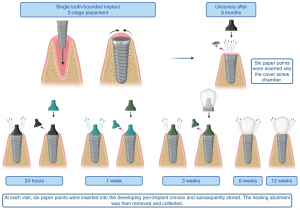Microbial pioneers: how bacteria shape dental implant health from day one
GA, UNITED STATES, May 30, 2025 /EINPresswire.com/ -- A new study suggests that the earliest microbes to colonize a dental implant may determine its long-term fate. Using high-resolution genomic sequencing and a 12-week clinical timeline, scientists tracked how microbial ecosystems form around new dental implants. Rather than a random colonization process, they found that bacteria trapped inside the implant's internal cover screw during surgery play a foundational role in shaping the community. These microbial pioneers not only dominate early but also influence which species arrive later. The findings point to a critical window where interventions could prevent peri-implantitis—a major cause of implant failure affecting millions of patients worldwide.
Dental implants have transformed modern dentistry, yet about 10% ultimately fail due to peri-implantitis—an inflammatory condition caused by microbial imbalance. Unlike natural teeth, implants lack a long evolutionary relationship with the oral microbiome, making them more susceptible to dysbiosis. While bacterial biofilms around implants resemble those on teeth, emerging research shows their development follows a different trajectory. Previous studies using low-resolution methods captured only a snapshot of these early dynamics. As dental implants become more widespread, deeper insight into how their microbial communities originate and evolve is urgently needed. To address these unresolved questions, researchers set out to chronicle the succession of microbial life from the moment of implant exposure.
In a study published in April 2025 in the International Journal of Oral Science, researchers from the University of Michigan and collaborating institutions investigated the microbial colonization of dental implants in 15 healthy adults. Samples were collected over six time points spanning 12 weeks. By combining whole-genome shotgun sequencing with network analysis, the team revealed a non-random, resilient microbial assembly process that begins within the implant itself. The research provides one of the most comprehensive timelines to date of how these hidden ecosystems take shape.
The team found that the primary seeding of the peri-implant microbiome comes from bacteria residing in the implant's internal cover screw chamber. Within 24 hours, species such as Streptococcus mitis and members of the Prevotella genus firmly established themselves and persisted throughout the study. These pioneers served as microbial "hubs", attracting or excluding later arrivals based on phylogenetic similarity—a pattern described as "nepotistic recruitment". In contrast to the more diverse and flexible microbiomes found around natural teeth, the peri-implant community was more deterministic and constrained. Even after disruption from crown placement, the implant microbiome showed striking resilience, returning to its original state within weeks. Functional analysis showed an initial shift toward anaerobic processes but maintained oxygen-dependent activity, underscoring a unique metabolic signature. As time passed, each implant's microbiome diverged further from neighboring teeth, signaling personalized and niche-specific development.
"Our findings challenge the idea that implants simply inherit bacteria from nearby teeth," said Dr. Purnima Kumar, senior author and professor at the University of Michigan. "Instead, we see a structured and stable process that begins with the implant's own microbial residents. This insight opens new possibilities to influence early colonization in ways that support better healing and long-term implant success."
These findings lay the groundwork for novel approaches to peri-implant care. Targeted interventions—such as antimicrobial strategies, probiotic coatings, or microbial "priming" at the time of implant placement—could shape the early community toward health rather than disease. The research also underscores the importance of ensuring periodontal health before implantation, as a single pathogenic strain could seed a harmful community. Looking ahead, scientists may focus on spatial mapping of microbial interactions or developing clinical tools to monitor early colonization. By leveraging our growing understanding of microbial succession, dental care can move from reaction to prevention—ensuring more implants succeed from the start.
References
DOI
10.1038/s41368-025-00367-7
Original Source URL
https://doi.org/10.1038/s41368-025-00367-7
Funding information
This study was supported by National Institutes of Health R03DE027492 to Shareef Dabdoub. Tamires Pereira Dutra is supported by National Institutes of Health, project number 7R01DE027857-06. The sequencing and data analysis was supported by National Institutes of Health R56DE033913 awarded to Purnima Kumar.
Lucy Wang
BioDesign Research
email us here
Legal Disclaimer:
EIN Presswire provides this news content "as is" without warranty of any kind. We do not accept any responsibility or liability for the accuracy, content, images, videos, licenses, completeness, legality, or reliability of the information contained in this article. If you have any complaints or copyright issues related to this article, kindly contact the author above.
Kenneth W. Welch Jr. Reveals Spiritual Entrepreneurship Secrets for Global Impact
New Study Establishes Supremacy of Complexity Science and Randomness in Machine Learning for Neurosymbolic Computation
ATA Ushers in a New Era of Intelligent API Management with AI at the Core
Więcej ważnych informacji
 Jedynka Newserii
Jedynka Newserii

 Jedynka Newserii
Jedynka Newserii

Polityka

Polska może się stać Doliną Krzemową Europy. Potrzeba jednak wsparcia finansowego start-upów i mocniejszej deregulacji
Polskie start-upy skoncentrowane są głównie na rozwoju nowoczesnych technologii informatycznych i cyfrowych. Wyraźny nacisk na oprogramowanie i aplikacje oraz big data i data science wskazuje na silne zainteresowanie narzędziami analitycznymi i rozwiązaniami wspierającymi transformację cyfrową w różnych branżach – wynika z raportu „Rynek start-upów w Polsce. Trendy technologiczne”, który został opracowany w 2024 roku w MRiT. Zdaniem europarlamentarzystów Polska ma szansę się stać Doliną Krzemową, jednak rozwój start-upów blokowany jest m.in. przez ograniczony dostęp do finansowania oraz niekorzystne i nadmierne regulacje.
Transport
Na półmetku wakacji ceny paliw na stacjach nie powinny się wyraźnie zmienić. Znaczące różnice między regionami i stacjami

W sierpniu ceny benzyny, oleju napędowego i autogazu powinny pozostać na poziomach z lipca – uważa ekspertka rynku z firmy Reflex. Wyższe będą zawsze na stacjach premium, tych, które oferują bogatszą ofertę dodatkową, promocje dla uczestników programu lojalnościowego, oraz w regionach, w których tradycyjnie paliwa są droższe ze względu np. na wyższą siłę nabywczą mieszkańców. Różnice mogą sięgać kilkudziesięciu groszy na litrze. Obszary, wokół których te wartości oscylują, zależą z kolei od sytuacji globalnej. Warto patrzeć na sytuację na Bliskim Wschodzie i w Ukrainie.
Polityka
A. Mularczyk (PiS): Nawiązanie poważnego dialogu z Niemcami jest konieczne nie tylko w kontekście reparacji. Powinien być podpisany traktat polsko-niemiecki

– Nie wystarczy jednorazowy gest czy inicjatywa. To musi być podjęcie dialogu, być może też przygotowanie nowej umowy bilateralnej, nowego traktatu polsko-niemieckiego, który regulowałby wszystkie obszary, które wynikały ze skutków II wojny światowej – mówi Arkadiusz Mularczyk, poseł do Parlamentu Europejskiego z PiS-u. Podkreśla, że proces ten nie będzie łatwy, bo wymaga konsekwencji i stanowczości, ale widzi szansę w prezydenturze Karola Nawrockiego, który już zadeklarował kontynuację starań w tym zakresie. Zdaniem europosła wsparciem w polsko-niemieckim dialogu może być administracja Donalda Trumpa.
Partner serwisu
Szkolenia

Akademia Newserii
Akademia Newserii to projekt, w ramach którego najlepsi polscy dziennikarze biznesowi, giełdowi oraz lifestylowi, a także szkoleniowcy z wieloletnim doświadczeniem dzielą się swoją wiedzą nt. pracy z mediami.




![Nestlé w Polsce podsumowuje wpływ na krajową gospodarkę. Firma wygenerowała 0,6 proc. polskiego PKB [DEPESZA]](https://www.newseria.pl/files/1097841585/fabryka-nesquik_1,w_85,r_png,_small.png)




.gif)

 |
| |
| |
|